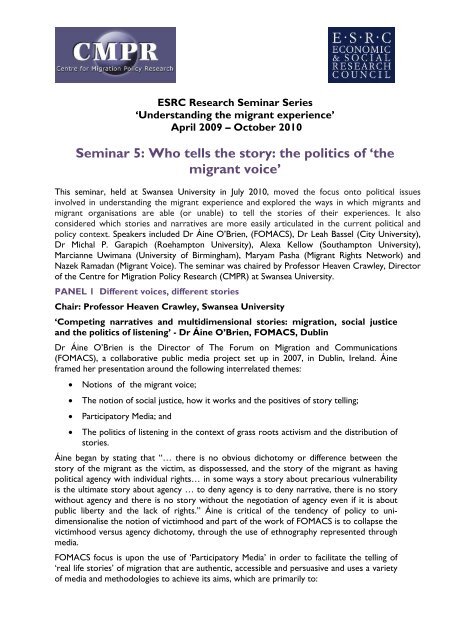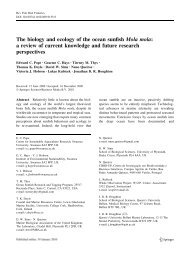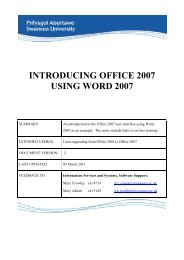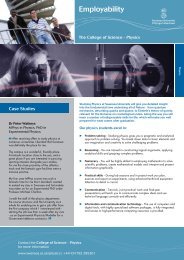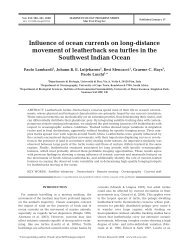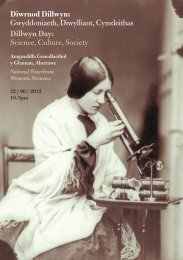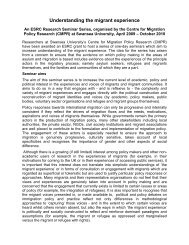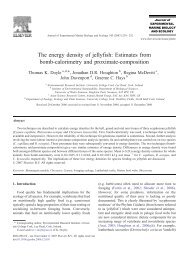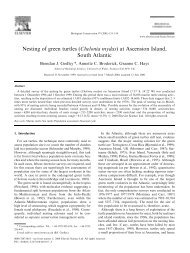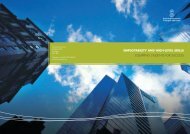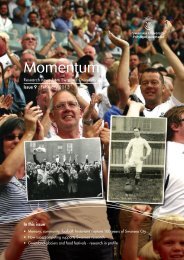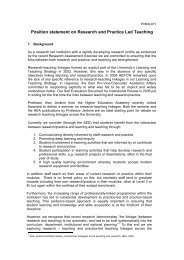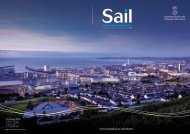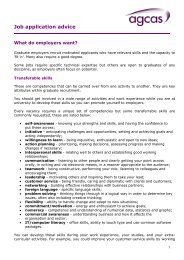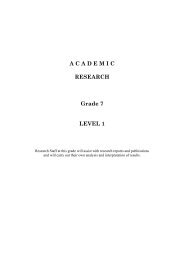ESRC Seminar Series - Briefing Paper 5 - Swansea University
ESRC Seminar Series - Briefing Paper 5 - Swansea University
ESRC Seminar Series - Briefing Paper 5 - Swansea University
Create successful ePaper yourself
Turn your PDF publications into a flip-book with our unique Google optimized e-Paper software.
<strong>ESRC</strong> Research <strong>Seminar</strong> <strong>Series</strong><br />
‘Understanding the migrant experience’<br />
April 2009 – October 2010<br />
<strong>Seminar</strong> 5: Who tells the story: the politics of ‘the<br />
migrant voice’<br />
This seminar, held at <strong>Swansea</strong> <strong>University</strong> in July 2010, moved the focus onto political issues<br />
involved in understanding the migrant experience and explored the ways in which migrants and<br />
migrant organisations are able (or unable) to tell the stories of their experiences. It also<br />
considered which stories and narratives are more easily articulated in the current political and<br />
policy context. Speakers included Dr Áine O’Brien, (FOMACS), Dr Leah Bassel (City <strong>University</strong>),<br />
Dr Michal P. Garapich (Roehampton <strong>University</strong>), Alexa Kellow (Southampton <strong>University</strong>),<br />
Marcianne Uwimana (<strong>University</strong> of Birmingham), Maryam Pasha (Migrant Rights Network) and<br />
Nazek Ramadan (Migrant Voice). The seminar was chaired by Professor Heaven Crawley, Director<br />
of the Centre for Migration Policy Research (CMPR) at <strong>Swansea</strong> <strong>University</strong>.<br />
PANEL 1 Different voices, different stories<br />
Chair: Professor Heaven Crawley, <strong>Swansea</strong> <strong>University</strong><br />
‘Competing narratives and multidimensional stories: migration, social justice<br />
and the politics of listening’ - Dr Áine O’Brien, FOMACS, Dublin<br />
Dr Áine O’Brien is the Director of The Forum on Migration and Communications<br />
(FOMACS), a collaborative public media project set up in 2007, in Dublin, Ireland. Áine<br />
framed her presentation around the following interrelated themes:<br />
• Notions of the migrant voice;<br />
• The notion of social justice, how it works and the positives of story telling;<br />
• Participatory Media; and<br />
• The politics of listening in the context of grass roots activism and the distribution of<br />
stories.<br />
Áine began by stating that “… there is no obvious dichotomy or difference between the<br />
story of the migrant as the victim, as dispossessed, and the story of the migrant as having<br />
political agency with individual rights… in some ways a story about precarious vulnerability<br />
is the ultimate story about agency … to deny agency is to deny narrative, there is no story<br />
without agency and there is no story without the negotiation of agency even if it is about<br />
public liberty and the lack of rights.” Áine is critical of the tendency of policy to unidimensionalise<br />
the notion of victimhood and part of the work of FOMACS is to collapse the<br />
victimhood versus agency dichotomy, through the use of ethnography represented through<br />
media.<br />
FOMACS focus is upon the use of ‘Participatory Media’ in order to facilitate the telling of<br />
‘real life stories’ of migration that are authentic, accessible and persuasive and uses a variety<br />
of media and methodologies to achieve its aims, which are primarily to:
• Amplify migrant voices and perspectives and to reach and engage a diversity of<br />
audiences;<br />
• Facilitate workshops, events and mentoring activities and then to transfer skills, into<br />
the NGO sector; and<br />
• Research migration and produce media in the service of social justice<br />
A critical point for FOMACS is the politics of story telling - the politics of the voice in terms<br />
of migrant experiences. As Áine highlighted “…everybody has voices, everybody has<br />
agencies, however, the problem is not just about giving voice it is about having those voices<br />
heard meaningfully.” Áine identified the politics of listening as a major factor in the<br />
intersection between story and strategy, particularly in relation to the impact of social media<br />
campaigns and their ability to effect change. Drawing on Romand Coles’ work on the power<br />
of listening, Áine left us with the following quote:<br />
“A big part of the problem too, is likely to be that most of us do not listen to one<br />
another well if and when we listen at all. We have not only marginalized the arts of<br />
voice, we have, relatedly, and perhaps even more so, marginalized the arts of<br />
listening. Certainly the democratic arts of voice and listening are deeply related, but<br />
all too often we interpret and seek to nurture democracy through a lens that greatly<br />
accents the former and adds the latter almost as an afterthought. The alternative<br />
idea here is that if democratic voices are weak in a community, it is probably<br />
significantly because efforts to develop political voice have not dwelled in nor<br />
sufficiently passed through the arts of listening” (Coles, 2004, p.687)<br />
The presentation was concluded with the showing of a variety of examples of FOMACS<br />
work, each of which represented very different types of story telling. These included a<br />
documentary film, an excerpt from a feature length film, a three minute animation and a<br />
digital story.<br />
‘Stories that matter: refugee women and the representation of political claims’ -<br />
Dr Leah Bassel, City <strong>University</strong><br />
Dr Leah Bassel’s presentation explored the ways in which migrant voices are, or are not,<br />
taken up in broader social and political narrative and how this particularly impacts upon the<br />
voices of migrant women and their ability to be heard.<br />
Leah firstly outlined the theoretical elements of her argument, drawn from democratic<br />
theory and the approach known as intersectionality. She then discussed practice on the<br />
ground in terms of the existing power relations and limits to articulating an alternative<br />
perspective, and how these become visible at the intersection between asylum and<br />
integration and immigration. Situating this in the broader social context of a “gendered<br />
politics of integration, the gendered politics of the way people make the transition from<br />
outsider to citizen”, Leah postulated that some women’s voices may be subject to<br />
misinterpretation and instrumetalisation whilst others may be denied or silenced. Leah<br />
related this to current debates around multiculturalism articulated through the veil, the<br />
burka, or full face covering, and issues around female genital mutilation and forced marriage,<br />
in this context she argued, the politics of integration can increasingly be viewed as a<br />
gendered politics of the body. However for Leah the issue is less about the politics of<br />
multiculturalism and more about the voice, agency and possibilities of participation for the<br />
women who are at the centre of these debates but who are also situated at the interception<br />
of multiple social justice agendas.<br />
Leah argued that “…it is not enough for the women who are seen to be at the centre of<br />
these debates to just be able to participate within them…meaningful participation …has to<br />
mean something more. It has to mean being able also to challenge the terms of the debate<br />
itself, to challenge the way that democratic context is even constructed.” Furthermore, Leah<br />
perceives the exclusion of voices that do not conform to the victim versus agent narrative<br />
as a democratic failure, a failure of politics. She concluded her presentation with an appeal
for a politics that doesn’t restrict political subjects just to “…responding to predetermined<br />
positions … but rather understands them as agents in the intercepting fields of multiple<br />
social justice agendas.”<br />
PANEL 2 Creating space for ‘the migrant voice’<br />
Chair: Dr Alex Rotas, Cardiff <strong>University</strong><br />
‘Nothing to do with us: class, ethnicity and power among Polish immigrants in<br />
UK’ - Dr Michal P. Garapich, Roehampton <strong>University</strong><br />
Dr Michal Garapich discussed the performance and articulation of meaning making practices<br />
through the medium of ethnicity, with specific reference to Polish immigrant communities in<br />
the UK. For Michal “…ethnicity is not something that people have it is rather what people<br />
do, and this means that it is a strategic resource that can be deliberately showed off in<br />
particular situations and might be under communicated in other situations” Refering to the<br />
title of the seminar, Michal observed that, “Who tells the story?” is only one aspect of the<br />
dilemma because it is not possible to abstract the teller of the story from the listener.<br />
Furthermore, the dominant story “…is a complex outcome of both internal competition for<br />
power, prestige and recognition within a particular group, … as well as what is the cultural<br />
and social environment that renders some stories more valuable and acceptable than<br />
others.”<br />
Michal illustrated this point with reference to the dominance of the ‘soldier narrative’ which<br />
constructs Polish and Eastern European Migrants as a model group for other migrants with<br />
regard to integration. Michal further developed this theme and applied it to the situation of<br />
London-based British Polish immigrant communities, arguing that there are particular<br />
dominant traits in discourses of emigration and Polish culture, one of which is the<br />
dichotomy between the economic and the political. Through his research, Michal has<br />
identified strong tensions and conflict between established groups of British Polish<br />
immigrants and those who arrived more recently as a result of the EU enlargement in 2004.<br />
Michal suggested that the dominant discourse excludes stories that do not fit or contradict<br />
the soldier narrative and its associations with productivity and work ethic, an example being<br />
the real and significant growth of poverty and destitution among Eastern European<br />
immigrants in the UK.<br />
For Michal, this is demonstrative of the complex interaction of class and ethnicity that is<br />
utilised to reproduce and maintain the dominant power relations within an immigrant group<br />
and control access to social inclusion.<br />
‘Refugee community organisations and the creation of social capital: a case<br />
study’ - Alexa Kellow, Southampton <strong>University</strong><br />
Alexa Kellow began by outlining the research project from which her case study was taken.<br />
She then introduced the notion of social capital, concluding with some findings and<br />
examples.<br />
Alexa’s research focuses on refugee led community organisations (RCOs) and has examined<br />
in depth, the process by which RCO’s increase access to social capital. Her case study was<br />
undertaken over a period of six months with an RCO for Albanian speakers and was used<br />
to develop a survey of London based RCOs. Alexa applied Social Capital Theory (the idea<br />
that people have social as well as political, financial or human capital which they can use as a<br />
resource in various ways) as developed by both Putman and Woolcock to the data from the<br />
case study. Woolcock identified three kinds of social capital:<br />
• Bonding social capital - connections between close friends and family;<br />
• Bridging social capital - connections between remote associates or friends; and<br />
• Linking social capital - connections to or between formal institutions.<br />
Alexa emphasised the importance of recognising that a social capital connection does not<br />
necessarily result in a resource. In light of this, her analysis separates resources and
categorises them as functions of immigrant associations as developed by John Rex. Rex<br />
identified five functions which immigrant associations carry out for their members:<br />
• Pastoral and social work;<br />
• Overcoming social isolation;<br />
• Goal attainment;<br />
• affirmation of culture, beliefs and values; and<br />
• maintaining links with the homeland.<br />
In presenting her findings, Alexa identified very strong evidence that the RCO in her case<br />
study provided opportunities for bonding social capital in terms of both new and existing<br />
connections. With regard to linking social capital, there was strong evidence of this at an<br />
organisational level. The evidence for bridging social capital was however less clear. Equally<br />
there was evidence of resources in terms of the five functions, with the exception<br />
maintaining links with the homeland, for which there was limited evidence.<br />
In conclusion, Alexa suggested that the evidence showed that the RCO presented in the<br />
case study provided its members with opportunities that they would not of otherwise had<br />
and that this in itself created social capital that often resulted in resources of the type<br />
identified by Rex. Alexa ended her presentation with a cautionary note regarding the impact<br />
of the precarious nature of the funding that RCOs receive.<br />
PANEL 2 Hearing ‘the migrant voice’<br />
Chair: Don Flynn, Migrant Rights Network<br />
‘Stories from the inside: using insider knowledge to make a difference?’ -<br />
Marcianne Uwimana, <strong>University</strong> of Birmingham<br />
Marcianne Uwimana presented her work as a community researcher for ‘Making a<br />
difference’, a project undertaken by Birmingham <strong>University</strong> and funded by the Joseph<br />
Rowntree Foundation. In collaboration with RCOs, the project identified four core themes<br />
where evidence was needed in order to achieve change at the policy level, these were:<br />
• Skills, work experience, qualifications and aspirations;<br />
• Experiences of ESOL;<br />
• Mental health and well being; and<br />
• Young people and education.<br />
The aims of the project included:<br />
• Building the capacity of researchers and RCOs to collect reliable evidence;<br />
• Gathering evidence around the themes; and<br />
• Using the evidence to lobby for change.<br />
In keeping with the stated aims, sixteen individuals were identified by the RCOs and<br />
underwent a programme of accredited training to become community researchers (CRs) for<br />
the project. Marcianne suggested that CRs have specialist knowledge and bring the following<br />
benefits to a project by virtue of being an ‘insider’. These benefits include:<br />
• Shared experiences that enable them to understand what migrants are trying to say;<br />
• Special access to communities because they are trusted;<br />
• Knowledge about how the needs and experiences of migrants can be known;<br />
• Language and cultural knowledge that can break down barriers; and<br />
• The ability to tell the story of migrants in migrants own words.
Referring to her own experience as a CR, Marcianne made a number of recommendations<br />
as to how academics could work with CRs in order to acknowledge their contribution and<br />
enhance their future opportunities. These included:<br />
• Build CRs into projects – as named researchers;<br />
• Give CRs the opportunity to contribute to the whole process;<br />
• Don’t assume that CRs can ONLY interview their peers;<br />
• Pay them at the same rate as other researchers;<br />
• Help them to develop their careers;<br />
• Think about how to support them i.e. developing a community research enterprise;<br />
• Credit CRs in the report; and<br />
• Work with CRs to disseminate findings and find new ways to disseminate.<br />
Marcianne concluded by presenting some of the findings and outcomes of the project in<br />
order to illustrate the distinctive value of using CRs, which she summarized as:<br />
• New insights – different perspective, powerful stories, wider access; and<br />
• Different ways of presenting information to policymakers<br />
Finally, and with regard to outcomes, Marcianne highlighted some of the developments that<br />
had taken place within the core areas of concern identified at the outset of the project.<br />
These include the following:<br />
• ESOL – findings from the research led to a review of ESOL provision in Birmingham;<br />
• Mental Health – a conference, the development of a Mental Health Network and<br />
commitment to providing a ‘one door’ Mental Health Service came about as a direct<br />
result of evidence gathered by CRs;<br />
• Employment – a displaced persons employment project was funded by The Working<br />
Neighbourhoods Fund; and<br />
• Migrant maternity – information regarding migrant women’s experiences of accessing<br />
maternity services was collated in order to inform both policy and practice.<br />
‘Strategies for empowerment: what should we aim for in our networks?’ -<br />
Maryam Pasha, Migrants’ Rights Network<br />
Maryam Pasha began by explaining the history and background that led to the formation of<br />
the Migrants’ Rights Network (MRN). She then described MRNs role and function, outlining<br />
for the group some of MRNs current and future plans and projects. Maryam concluded by<br />
posing some important questions regarding the potential of migrant networks.<br />
According to Maryan, MRN is based on themes and issues identified as being of concern to<br />
migrant community organisations across the country and developed out of a response to a<br />
number of factors including:<br />
• The government’s prevailing perspective, i.e. ‘ managed migration’;<br />
• Questions such as ‘What are migrant rights?’ and ‘What is the role of citizenship?’;<br />
• Examining what was happening locally which led to concerns regarding the variability<br />
across country; and
• Identifying what was missing -<br />
• National voice<br />
• Resources and skills<br />
• Practical information and tools from NGOs and researchers<br />
Maryam summarized the role of the MRN as providing support to organisations by<br />
establishing networks, identifying issues and influencing the outcome of policy discussions.<br />
MRN sees its role less as one of representing migrants but rather as a facilitator, promoting<br />
and enabling dialogue between organisations at both a local and national level and providing<br />
strategic analysis of national policy. Within this broader remit, a key aim of MRN is to<br />
facilitate discussions between different organisations and enable local groups to act outside<br />
of their immediate contacts. This led to the development of the MRN’s Communication<br />
Strategies Project. Maryam explained that the Communication Strategies Project is a pilot<br />
project which aims to:<br />
• Develop the skills and capacity of activists and organisations working at regional level<br />
to communicate messages in support of migrants;<br />
• Establish an interactive web-based platform for communications which support<br />
progressive debate on migration; and<br />
• Feed regional perspectives on migrants’ rights into wider policy and advocacy<br />
debates in the UK;<br />
The Project aims ultimately to change the debate in the UK by empowering local activists to<br />
build regional and national networks of migrant organisations.<br />
Following a detailed explanation of how the project intends to achieve its goals, Maryam<br />
returned to her opening question, namely ‘what should we aim for in our networks?’ and<br />
presented a number of potential answers for the group to consider. Maryam concluded by<br />
outlining the on-going aims of the MRN at both the local and national level, stating that<br />
“ultimately doing this will establish a progressive narrative and promote migrants’ rights and<br />
needs and really hold up something in opposition to what is prevailing”.<br />
‘Voices for change: transforming how migrants are seen and heard in the media’<br />
- Nazek Ramadan, Migrant Voice<br />
Nazek Ramadan is the founder and editor of the Migrant Voice organisation. Nazek<br />
described Migrant Voice as a migrant-led organisation set up to develop the skills, capacity<br />
and confidence of members of migrant communities, to enable them to author and produce<br />
their own media representations in order to influence policy making, and as a counter to<br />
the very successful but negative media campaigns of organisations such as Migration Watch.<br />
Although Migrant Voice has a number of expert members it considers itself to be a platform<br />
primarily for those migrants whose voices are not usually heard.<br />
Nazek outlined the circumstances that led to the publication of the first issue of the Migrant<br />
Voice Newspaper. The target audience of this publication was the general public, with the<br />
aim of increasing the visibility of migrants whilst countering the prevailing negative public<br />
opinion. The newspaper, written by migrants, about migrants and migration related matters,<br />
was distributed for free across London by those who had authored it. An important<br />
element of this method of distribution was that it enabled the public to ask questions of, and<br />
engage directly with the journalists about the material. As Nazek remarked: “You hear them<br />
better when you look them in the eye. You hear anyone better when you look them in the<br />
eye but we are not visible and people don’t see us”.<br />
Nazek outlined Migrant Voice’s plans for future work and concluded with the salient words<br />
of President Obama: “Change will not come if we wait for some other person or some<br />
other time. We are the change that we seek”.
PANEL 4 Conclusions and reflections<br />
Professor Heaven Crawley, <strong>Swansea</strong><br />
The seminar concluded with a discussion of the key themes and issues which emerged over the<br />
course of the day. Despite a diversity of experiences and perspectives, a number of issues<br />
resonated across the presentations and discussion and require further consideration when<br />
thinking how best we can represent the voices of the migrant communities with whom we work:<br />
• There is a tension in dominant representations of ‘the migrant voice’. Migrants are most<br />
commonly presented as victims or oppressed but there is also a story (less often heard)<br />
of the migrant as a political activist or an individual with rights. The question of which of<br />
these represents the ‘authentic voice’ or the migrant remains contested and changes over<br />
space and time.<br />
• The issue of ‘who tells the story?’ is a complex one and largely contingent on who is given<br />
the space to express / articulate a voice. This will depend in part on differences of power<br />
and access which are associated with different statuses and identities within and between<br />
migrant communities. These differences in power and access are associated, most<br />
commonly with age and gender, but also with educational background and previous<br />
experience of political engagement and activism. The dangers of ‘essentialising’ the<br />
migrant experience through particular associations and representations were emphasised<br />
by several speakers.<br />
• The content of the story is as important as who tells it. Differences within and between<br />
the experiences and backgrounds of different migrant communities were emphasised.<br />
Many participants considered that there is no necessary dichotomy between the migrant<br />
as victim and oppressed and as an individual with rights but considered that some migrant<br />
groups and some communities choose to present specific aspects of their experiences and<br />
identities over others to reflect the wider political and policy context within which they<br />
find themselves.<br />
• Several speakers reflected on the implications of utilising different approaches to<br />
capturing and representing ‘the migrant experience’. Reflecting and building on earlier<br />
methodological considerations (<strong>Seminar</strong> 3), there was a focus on the constraints and<br />
opportunities provided by different techniques, for example, digital story telling, and in<br />
working with researchers from different backgrounds.<br />
• It was concluded that ‘who hears the story’ of migration and of the migrant is often a<br />
reflection of the political context within which the story is being told and the motivations<br />
of those to whom it is being communicated. This may require some difficult strategic<br />
decisions to be made about where to target stories about ‘the migrant experience’.
List of participants<br />
Nilu Ahmed<br />
Dr Leah Bassel (speaker)<br />
Simone Bizzell-Browning<br />
Maria Boex<br />
Kirstie Bowden<br />
Katy Brickley<br />
Maria Brightwell<br />
Alex Collis<br />
Professor Heaven Crawley (chair)<br />
Dr Lisa Doyle<br />
Dia Flores<br />
Don Flynn (chair)<br />
Dr Michal P. Garapich (speaker)<br />
Dr Keith Halfacree<br />
Lucy Jackson<br />
Katharine Jones<br />
Stuart Jones<br />
Senzeni Kamuriwo<br />
Alexa Kellow (speaker)<br />
Lynda Lawrence<br />
Mike Lewis<br />
Kuchi Makari<br />
Jason Matthews<br />
Norbert Mbu Mputu<br />
Joy Merrell<br />
Aitemad Muhanna<br />
Latefa Narriman<br />
Dr Áine O’Brien (speaker)<br />
Maryam Pasha (speaker)<br />
Nazek Ramadan (speaker)<br />
Emily Robertson<br />
Dr Sam Scott<br />
Eleanor Staniforth<br />
Dr Peter Skrandies<br />
Beata Switek<br />
Professor Alan Thomas<br />
Ayo Thompson<br />
Dr Caroline Tie<br />
Constance Tounkap<br />
Marcianne Uwimana (speaker)<br />
Fides Vyubuzima<br />
CMPR, <strong>Swansea</strong> <strong>University</strong><br />
City <strong>University</strong><br />
CMPR, <strong>Swansea</strong> <strong>University</strong><br />
<strong>Swansea</strong> <strong>University</strong><br />
<strong>University</strong> of Exeter<br />
Cardiff <strong>University</strong><br />
Royal Holloway<br />
Anglia Ruskin <strong>University</strong><br />
CMPR, <strong>Swansea</strong> <strong>University</strong><br />
Refugee Council<br />
London School of Economics<br />
Migrant Rights Network<br />
CRONEM, Roehampton <strong>University</strong><br />
<strong>Swansea</strong> <strong>University</strong><br />
Aberystwyth <strong>University</strong><br />
Manchester <strong>University</strong><br />
<strong>Swansea</strong> Digital Storytelling<br />
Queen Mary <strong>University</strong><br />
Southampton <strong>University</strong><br />
Sandwell Metropolitan Borough Council<br />
Welsh Refugee Council<br />
IOM<br />
South People's Project<br />
<strong>Swansea</strong> <strong>University</strong><br />
<strong>Swansea</strong> <strong>University</strong><br />
CMPR, <strong>Swansea</strong> <strong>University</strong><br />
FOMACS, Dublin<br />
Migrants Rights Network<br />
Migrant Voice<br />
African Community Project<br />
<strong>University</strong> of Bristol<br />
<strong>Swansea</strong> <strong>University</strong><br />
<strong>University</strong> of Greenwich<br />
<strong>University</strong> College London<br />
<strong>Swansea</strong> <strong>University</strong><br />
African Community Project<br />
<strong>University</strong> of Bedfordshire<br />
Women Seeking Sanctuary Advocacy Group<br />
Wales<br />
<strong>University</strong> of Birmingham


